The Chinese company nearly doubled its emissions in 2023, according to its own report, making it the biggest polluter in the industry.
In 2023, the fast fashion giant Shein was everywhere. Crisscrossing the globe, airplanes ferried small packages of its ultra-cheap clothing from thousands of suppliers to tens of millions of customer mailboxes in 150 countries. Influencers’ “#sheinhaul” videos advertised the company’s trendy styles on social media, garnering billions of views.
At every step, data was created, collected, and analyzed. To manage all this information, the fast fashion industry has begun embracing emerging AI technologies. Shein uses proprietary machine-learning applications — essentially, pattern-identification algorithms — to measure customer preferences in real time and predict demand, which it then services with an ultra-fast supply chain.
As AI makes the business of churning out affordable, on-trend clothing faster than ever, Shein is among the brands under increasing pressure to become more sustainable, too. The company has pledged to reduce its carbon dioxide emissions by 25 percent by 2030 and achieve net-zero emissions no later than 2050.
But climate advocates and researchers say the company’s lightning-fast manufacturing practices and online-only business model are inherently emissions-heavy — and that the use of AI software to catalyze these operations could be cranking up its emissions. Those concerns were amplified by Shein’s third annual sustainability report, released late last month, which showed the company nearly doubled its carbon dioxide emissions between 2022 and 2023.
“AI enables fast fashion to become the ultra-fast fashion industry, Shein and Temu being the fore-leaders of this,” said Sage Lenier, the executive director of Sustainable and Just Future, a climate nonprofit. “They quite literally could not exist without AI.” (Temu is a rapidly rising e-commerce titan, with a marketplace of goods that rival Shein’s in variety, price, and sales.)
[…]
The Biden Admin just announced an executive order removing de minimis tax protections from large companies trying to exploit it to import large quantities of product, which is going to take a bite out of Shein and Temu’s business models.
God forbid peasants use some common sense and not participate in this scam!
Watching china social media to buy china plastic trash… at some point people will have to start owning their consumption patterns. But as of now to question this is a thought crime and will be met with out right hostility.
You bring up thought crime but forget that the entire point of newspeak is to reduce the ability to think at all.
Most people can’t own their consumption patterns while under the constant barrage of mental reprogramming that is advertising.
Most people can’t own their consumption patterns while under the constant barrage of mental reprogramming that is advertising.
I agree with this sentiment hence why nothing will change quickly, it will take generations for this change to occur once people sucked into the propaganda be it cable teevee for boomers, reddit for millennials or tiktok for genz, they just larp whatever they are fed unless something traumatic happens and they reassess.
I can’t change how these people think or how they consume beyond some shit posting online maybe it will catch somebody’s attention but what I can do is not participate in that shit myself.
I get that many things are not discretionary but people can absolutely not shop on china plastics trash websites and buy less plastic at walmart. Funny enough most of these people will screech “environment” but they won’t act for it.
Apparently, the average American buys new clothes every week. That’s not fucking sustainable, that’s for sure
at some point people will have to start owning their consumption patterns.
Next time you are buying groceries, don’t buy anything that has any plastic in the packaging and then get back to us on how avoiding plastic is merely a matter of choice.
Nearly all clothing is full of plastic these days as well. Plastic from china is just as bad for the environment as plastic from any other country.
People had clothing before plastic and based on how much clothing people by per capita, they could reduce… But god forbid they make decisions like that 🤡



